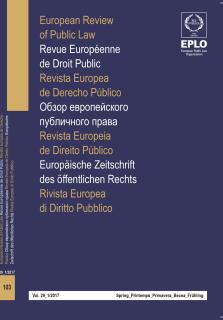
EU Citizenship and Cross-border Access to Social Benefits -
The Recent Evolution of the CJEU Case-law
Assistant Professor at the University of Lisbon School of Law;
Senior Research Fellow at Centro de Investigação de Direito Público
(CIDP - Lisbon Centre for Research in Public Law);
Assessor (Law Clerk) at the Portuguese Constitutional Court
Since its creation, the concept of EU citizenship, as well as the rights and duties it entails, have evolved greatly, notably in the area of social rights. The CJEU case-law broadened non-national EU citizens’ rights to claim social benefits while narrowing Member States’ scope to restrict their access to national welfare systems. However, the recent Dano and Alimanovic judgments present a striking shift in relation to the previous case-law, establishing limits on the right of EU citizens to social assistance in host Member States. The right to reside in another Member State appears to be made dependent on the worker status of the citizen, in order to avoid becoming ‘an unreasonable burden on the social system of the host Member State’. Several questions remain. Were these decisions an attempt to address the debate on ‘welfare tourism’? Is the CJEU backtracking? What is left of the previous jurisprudence?
Depuis sa création, le concept de citoyenneté de l’UE ainsi que les droits et devoirs que celle-ci comporte ont grandement évolué, notamment dans le domaine des droits sociaux. La jurisprudence de la CJUE a élargi le droit des citoyens de l’UE non-nationaux de réclamer des avantages sociaux, tout en limitant la possibilité pour les Etats membres de restreindre l’accès à leurs systèmes de santé nationaux. Cependant, les arrêts récents Dano et Alimanovic marquent un tournant dans la jurisprudence en établissant des limites au droit des citoyens de l’UE de bénéficier de la sécurité sociale des pays membres d’accueil. Le droit de résider dans un autre Etat membre semble lié au statut de travailleur du citoyen, afin d’éviter qu’il devienne “une charge déraisonnable pour le système d’assistance sociale de l’Etat membre d’accueil”. Certaines questions restent posées. Ces arrêts essaient-ils de régler le débat sur le “tourisme social”? La CJUE fait-elle marche arrière? Que reste-t-il de la jurisprudence antérieure?





















